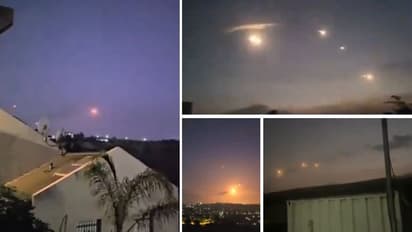Hezbollah claims 320 rockets launched on 11 Israeli sites in '1st phase' of attack after IDF airstrike (WATCH)

Synopsis
Israel launched intense airstrikes in southern Lebanon, targeting Hezbollah amid fears of escalating conflict. Hezbollah retaliated with drone attacks on Israel, citing a response to the assassination of a commander. This escalation complicates ongoing cease-fire efforts in Gaza and raises regional war concerns.
Israel launched a series of intense airstrikes in southern Lebanon early Sunday, marking a significant escalation in the ongoing conflict with the Hezbollah terrorist group. The Israeli military described the operation as a pre-emptive strike aimed at thwarting an imminent attack by Hezbollah, which it said was planning a heavy barrage of rockets and missiles targeting Israel. The development threatens to widen the conflict into a broader regional war, undermining ongoing efforts to broker a cease-fire in Gaza.
The Israeli Defense Forces (IDF) reported that the airstrikes were conducted to neutralize terror targets in Lebanon, from where Hezbollah was allegedly preparing its assault. Rear Admiral Daniel Hagari, Israel's military spokesman, emphasized the self-defensive nature of the operation, warning Lebanese civilians to evacuate areas where Hezbollah operates to avoid harm. “We can see that Hezbollah is preparing to launch an extensive attack on Israel while endangering the Lebanese civilians,” Hagari said.
Following the strikes, Hezbollah announced it had initiated a retaliatory attack on Israel, deploying a "large number of drones" to target what it described as a "qualitative Israeli military target." The group stated that this attack was in response to Israel’s assassination of Fouad Shukur, a senior Hezbollah commander, in Beirut last month. Hezbollah's statement also mentioned that the operation targeted multiple enemy sites, including military barracks and Iron Dome missile defence platforms.
Hezbollah later added that the "first phase" of its attack on Israel was complete.
The Iran-backed group claimed it had successfully struck 11 Israeli military sites using drones and more than 320 Katyusha rockets.
In response to the escalating conflict, air raid sirens blared across northern Israel, and Ben-Gurion International Airport in Tel Aviv began diverting incoming flights and delaying takeoffs. Israeli media reported that dozens of Israeli warplanes were involved in the airstrikes, with flight-tracking data showing at least two El Al flights diverting from their planned routes.
The airstrikes occurred against the backdrop of renewed diplomatic efforts to end Israel’s ongoing war with Hamas in Gaza, now in its 11th month. Egypt is hosting a fresh round of talks aimed at halting the conflict, with Hezbollah signalling its willingness to cease hostilities if a cease-fire is reached.
Diplomatic efforts to de-escalate the situation have intensified in recent weeks, with diplomats from the U.S. and Europe visiting both Israel and Lebanon. Their goal is to prevent the conflict from spiralling into a broader regional war, potentially drawing in the United States and Iran. Israel’s Defense Minister recently announced the movement of additional troops to the Lebanese border in anticipation of possible fighting with Hezbollah.
Hezbollah has been actively engaged in the conflict since October 7, when a surprise Hamas cross-border attack on Israel ignited the current hostilities. Since then, Israel and Hezbollah have exchanged fire almost daily, leading to widespread displacement on both sides of the border. However, until now, both parties have largely avoided actions that could trigger an all-out war.
Hezbollah is considered to have a formidable arsenal, estimated at 150,000 rockets and missiles, including precision-guided munitions. The group has also increasingly deployed drones, posing a challenge to Israel's defences.
Hezbollah said in a statement on Sunday morning that the “first phase” of its attack against Israel was completed, saying it was a response to the killing of its top commander in Beirut nearly a month ago.
The Iran-backed group said it had successfully targeted 11 Israeli military sites with drones and over 320 Katyusha rockets.
It added that it would release further details about its attack against Israel soon.
Check the Breaking News Today and Latest News from across India and around the world. Stay updated with the latest World News and global developments from politics to economy and current affairs. Get in-depth coverage of China News, Europe News, Pakistan News, and South Asia News, along with top headlines from the UK and US. Follow expert analysis, international trends, and breaking updates from around the globe. Download the Asianet News Official App from the Android Play Store and iPhone App Store for accurate and timely news updates anytime, anywhere.